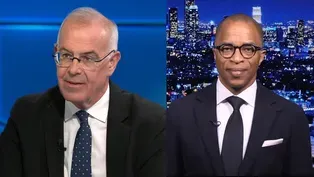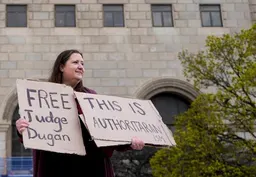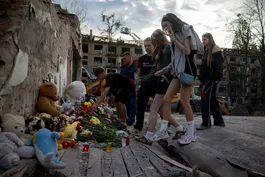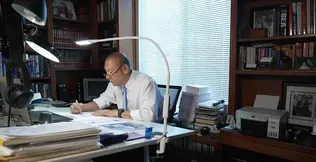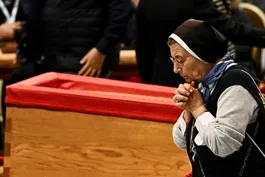
'People are starving,' WFP says as Israel blocks aid to Gaza
Clip: 4/25/2025 | 7m 38sVideo has Closed Captions
'Food is not political,' WFP head says as U.S. cuts aid and Israel blocks help to Gaza
The World Food Programme says it has delivered the last of its food in Gaza and warned the kitchens it has been supporting would run out of food in days. Nick Schifrin spoke with Executive Director Cindy McCain who says a lack of funding has forced WFP to cut 30 percent of its staff as it faces unprecedented challenges in feeding the hungry in Haiti.
Problems with Closed Captions? Closed Captioning Feedback
Problems with Closed Captions? Closed Captioning Feedback
Major corporate funding for the PBS News Hour is provided by BDO, BNSF, Consumer Cellular, American Cruise Lines, and Raymond James. Funding for the PBS NewsHour Weekend is provided by...

'People are starving,' WFP says as Israel blocks aid to Gaza
Clip: 4/25/2025 | 7m 38sVideo has Closed Captions
The World Food Programme says it has delivered the last of its food in Gaza and warned the kitchens it has been supporting would run out of food in days. Nick Schifrin spoke with Executive Director Cindy McCain who says a lack of funding has forced WFP to cut 30 percent of its staff as it faces unprecedented challenges in feeding the hungry in Haiti.
Problems with Closed Captions? Closed Captioning Feedback
How to Watch PBS News Hour
PBS News Hour is available to stream on pbs.org and the free PBS App, available on iPhone, Apple TV, Android TV, Android smartphones, Amazon Fire TV, Amazon Fire Tablet, Roku, Samsung Smart TV, and Vizio.
Providing Support for PBS.org
Learn Moreabout PBS online sponsorshipAMNA NAWAZ: Today, the World Food Program announced it had delivered the last of its food in Gaza and warned the kitchens it's been supporting there would run out of food in days.
Nick Schifrin spoke earlier with Cindy McCain, head of the World Food Program, about conditions in Gaza, a lack of funding that's forced her to cut 30 percent of the WFP staff worldwide, and the unprecedented challenges feeding the hungriest in another country that she's currently visiting, Haiti.
NICK SCHIFRIN: The World Food Program is the world's largest humanitarian organization.
And, today, it says some 340 million people face severe food insecurity because of conflict, instability and climate change.
This week, WFP Executive Director Cindy McCain is visiting Haiti, where some 5.7 million people, more than half the country's population, face high levels of acute food insecurity.
And earlier this week, the U.N. warned that gang violence had spread so much, without more international support, there will be more violence and Haiti could -- quote -- "face total collapse."
And Cindy McCain now joins me from Cap-Haitien in Haiti.
Cindy McCain, thanks very much.
Welcome back to the "News Hour."
I just read all of those U.N. dire warnings about Haiti.
You have been traveling around.
You visited schools that provide locally grown meals.
You visited factories that produce snack kits for kids.
How dire is the lack of food for so many?
CINDY MCCAIN, Executive Director, World Food Program: It's a very, very serious problem, as you just stated.
This -- Haiti itself is a powder keg.
And with the lack of food and the lack of ability to obtain food for most of the population, this is a place that could go at any moment.
I'm very worried that the world has forgotten about Haiti.
We really, really, really need to pay attention here, and we really, really need to coordinate countries to get together and do action here to help Haiti get back on its feet.
NICK SCHIFRIN: The WFP has been negotiating with armed groups to try and get access to some of these areas that are difficult to reach, but how much has the violence impeded your ability to actually help the hungry?
CINDY MCCAIN: Well, it's impeded a lot.
We do negotiate with the gangs.
We do get in.
But, again, the violence itself, the inability to have a coordinated effort that's at scale to be able to feed people is just -- it's nonexistent here.
There's famine here.
No one really talks about famine in Haiti, but there's about 8,500 people that are in famine conditions now.
That's tragic.
NICK SCHIFRIN: Let's switch over to Gaza.
The World Food Program has been delivering flour.
The flour has now run out.
The WFP has been handing out food parcels.
That has now run out.
And then we have the announcement today.
As we said, you have been delivering food for kitchens to cook hot meals, and that has now run out in terms of that food stock.
This is a consequence of Israel's block on aid into Gaza for some seven weeks now.
What does this mean for the people of Gaza?
CINDY MCCAIN: Oh, this is a tragic set of circumstances.
People are starving, and they're going -- many more are going to starve as a result of this.
We need to be able to not only have a cease-fire, but be able to get in at scale.
Our last truck left today.
That's the last of what we had stored inside Gaza.
There's nothing left.
There's no place to go for food anymore.
NICK SCHIFRIN: You and the U.N. overall has warned in the past that North Gaza especially has been on the brink of famine.
What are the conditions there now?
Are there fears of famine today?
CINDY MCCAIN: There are fears of famine, sure.
Our inability to get in and our inability to deliver at scale is what's causing this.
We -- again, we need a cease-fire.
We need to be able to get at scale.
We need the world to say, let -- let the humanitarians in.
NICK SCHIFRIN: Another emergency worker in Gaza recently said that this phase of the war, since the fighting resumed on March 18, has been one of the -- quote -- "darkest chapters" of the war.
How has this phase been different?
And have aid workers been killed while doing their jobs?
CINDY MCCAIN: Yes to all of that.
Our people that have been on the ground from the very beginning, because they can't get out, are -- I worry about their well-being.
It is a very dark period.
The world has turned its back on what we really need to be doing.
Food is not political.
And to make food political is something that is unconscionable, number one, but, number two, it just shouldn't happen.
NICK SCHIFRIN: The Israeli government, as you know, has been arguing that Hamas has used food aid as a tool to maintain its power in Gaza, for example, taking the food and selling it and converting that money into some military capacity.
Do you agree?
And how can you prevent that?
CINDY MCCAIN: I don't necessarily agree with that.
No, our people have not seen evidence of that.
Now, mind you, we have seen violence.
But these were hungry people trying to get food off a truck.
It's very hard to watch, which our people are having to do, watch people starve to death, and knowing that we have the capability to deliver and can't -- and we can't do it.
NICK SCHIFRIN: I want to switch over to World Food Program itself as well as U.S. support for it and U.S. foreign aid.
Can you confirm that WFP plans to cut some 30 percent of the work force, some 6,000 jobs?
And why have you made that decision, if that is correct?
CINDY MCCAIN: Yes, that is correct.
We, like everyone else, have lost 40 percent of our budget.
From our standpoint, we were already in the middle of cutting back.
So now this is just kind of the top end of this.
Now we're going to have to have to have to remove jobs.
And I'm -- it breaks my heart.
But it's what's necessary right now.
NICK SCHIFRIN: You and I have talked before about how the funding shortfall preceded the Trump administration.
We have seen the Trump administration take away some funds to WFP, give back some funds to WFP.
Right now, do you have the money that the Trump administration has said it is giving you?
Because you warned that the cuts that the Trump administration was going to make to the WFP would be -- quote -- "amount to a death sentence for millions of people."
CINDY MCCAIN: We're dealing with a situation where sometimes the right hand doesn't know what the left hand's doing.
We have received some of the funds that were promised, yes, that were in the pipeline.
We're not completely there yet.
The world collectively has taken -- has stepped back from some of these disasters and these issues that we face every day with regards to hunger.
It's not just the United States.
It's also European countries.
It's our Middle Eastern friends, although they're beginning to step up a little bit now, but -- and our Asian friends also.
NICK SCHIFRIN: But take on the argument that the Trump administration has been making.
One example from the State Department says it has been fixing -- quote -- "decades of mismanagement, fraud, and misaligned priorities in the delivery of foreign assistance."
Do you believe U.S. assistance, U.S. priorities on foreign aid have been misaligned?
CINDY MCCAIN: You know, I can't really answer that.
I don't -- have never seen that, but what I do know is that we were all top-heavy.
We were big.
We have gotten big, and AID was no different than that.
It was time for all of us to take -- to relook at how we operate.
I would never say anything bad about AID.
We have been great partners in the field, and we have worked together, obviously, for years and years and years.
NICK SCHIFRIN: Cindy McCain, executive director of the World Food Program, thank you very much.
CINDY MCCAIN: Thanks for having me.
Brooks and Capehart on Trump's reaction to public pressure
Video has Closed Captions
Brooks and Capehart on Trump's reaction to public pressure (9m 31s)
FBI charges judge with obstructing immigration agents
Video has Closed Captions
Judge charged with obstructing immigration agents, escalating Trump's fight with judiciary (6m 54s)
News Wrap: U.S. envoy meets with Putin for talks to end war
Video has Closed Captions
News Wrap: U.S. envoy meets with Putin for talks to end Russia's war in Ukraine (4m 15s)
Political cartoonists navigate a changing media landscape
Video has Closed Captions
Political cartoonists on navigating a changing media landscape (7m 55s)
U.S. business leaders shifting plans because of tariffs
Video has Closed Captions
How U.S. business leaders are shifting plans amid tariffs and uncertainty (7m 24s)
Vatican prepares for potentially polarizing papal conclave
Video has Closed Captions
Vatican readies for Francis' funeral and potentially polarizing papal conclave (6m 44s)
Providing Support for PBS.org
Learn Moreabout PBS online sponsorshipSupport for PBS provided by:
Major corporate funding for the PBS News Hour is provided by BDO, BNSF, Consumer Cellular, American Cruise Lines, and Raymond James. Funding for the PBS NewsHour Weekend is provided by...
